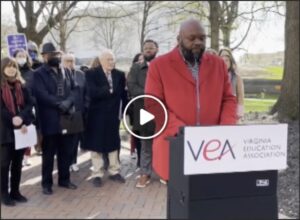by James A. Bacon
A coalition of left-wing groups has organized to contest Governor Glenn Youngkin’s effort to expunge “inherently divisive concepts” from Virginia’s public school system. Among the member organizations are the Virginia Education Association, the Legal Aid Justice Center, and the Virginia chapter of the NAACP. One is tempted to say that an unofficial member of the coalition is the Richmond Times-Dispatch, whose one-sided coverage of the issue demonstrates that it has abandoned any pretense of impartiality.
Last month Superintendent of Public Instruction Jillian Balow identified policies, programs, training and curricula that violate federal Civil Rights law, including administrative materials that advocate “anti-racism,” or reverse racism. “We must continue to ensure that no student in Virginia is taught to judge or treat others differently solely on the basis of their race, skin color, ethnicity, sex or faith,” she said in the preliminary report.
At a news conference yesterday, the organizations blasted her assessment. It appears that the coalition’s strategy is to systematically misrepresent the Youngkin administration’s position and obscure the nature of the policies and guidelines the Governor seeks to change, knowing that the mainstream media will frame the narrative in their favor.
“We will not stand idly by while [Youngkin] and his administration attempt to roll back the recent progress we’ve made in teaching honest and culturally competent lessons in Virginia public schools for blatant political gain,” said James Fedderman, the president of the Virginia Education Association. Youngkin, he said, is exploiting “the fear of a small group of parents” for a political agenda.
“We stand against any efforts to dismantle the progress that’s been made toward an inclusive society by those claiming we must only teach a sanitized version of history,” said the Rev. Elisha Burke, a board member of the Virginia Interfaith Center for Public Policy. Fedderman reinforced that point, citing a poll finding that 63% of Virginians support teaching how racism continues to impact American history.
Burke and Fedderman repeated the charge — repeated incessantly without factual basis — that Youngkin wants to downplay the teaching of slavery and segregation in Virginia, or as Burke puts it, to teach “a sanitized version of history.”
Meanwhile, here is how RTD reporter Mel Leonor describes Balow’s memo:
The resulting memo describes affirmative action policies in schools as discriminatory, suggests that historic discrimination in education might not be to blame for disparate outcomes among students of color, and rejects the idea that white people may unwittingly benefit from systemic racism and discrimination.
The report made the case that schools have unduly emphasized “equitable outcomes” over “equal opportunity.”
The memo defended the scrapping of “EdEquityVA,” a state initiative that promoted equity and diversity through resources for school districts. That included an entire website dedicated to increasing cultural competency among Virginia teachers, and a “suggested readings” list that includes historian and MacArthur Fellow Ibram X. Kendi.
Here’s a sampling of material Leonor left out, quoted directly from Balow’s memo:
- Numerous resources within EdEquityVA employ the concept that current discrimination is needed to address past discrimination. (Treating people differently based on skin color to remedy old/previous discrimination.)
- Numerous resources within EdEquityVA advance “equity,” which is redefined to mean that there can be no differences or disproportionalities between students—and any difference in what students have or what they achieve is due to systemic racism.
- Achieving equity, versus individual student achievement, is the emphasis. The guiding mission statement for the tool is, “Education Equity is achieved when we eliminate the predictability of student outcomes based on gender, zip code, ability, socioeconomic status or language spoken at home.”
- Divisive concepts taught in the training including (but are not limited to): “redress” bias in the system; include “culturally responsive” efficacy in teacher evaluation; mitigate power imbalances; develop policy to advance “anti-racism;” be change agents for social justice and academic equity.
There’s more, but you get the idea.
In place of an ideology that divides the world between White oppressors and minority victims, and seeks redress through reverse discrimination and lowering of standards, Youngkin is pursuing a positive, forward-looking agenda of opportunity for all. But you would get no sense whatsoever of that from Leonor’s article or almost anything else the RTD writes. Nor would you ever glean from newspaper accounts the spectacular failure of social justice-inspired educational policy, as measured by standardized test scores. Not only is social-justice rhetoric divisive, but disparities in educational achievement in Virginia have gotten worse, not better.
In her memo, Balow expresses the hope that the Youngkin administration can “spur productive dialogue across the commonwealth.” Sadly, that’s a pipedream. There can be no productive dialogue when one side of the debate so systematically misrepresents reality and the mainstream media so disgracefully aids them in the effort.



